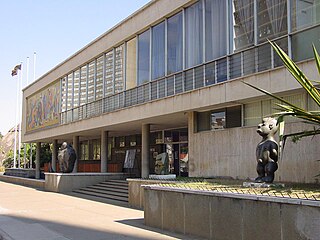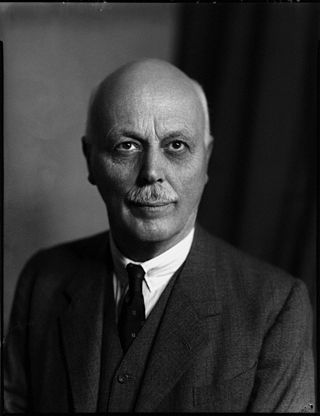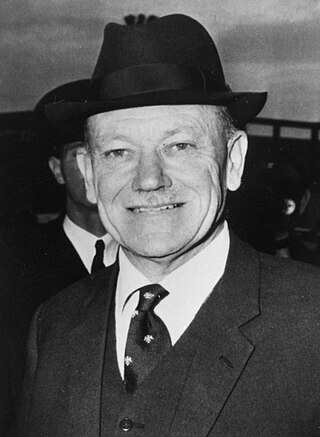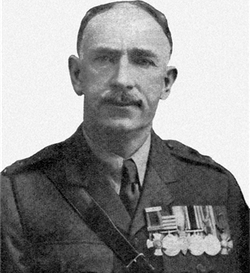Related Research Articles

Northern Rhodesia was a British protectorate in south central Africa, now the independent country of Zambia. It was formed in 1911 by amalgamating the two earlier protectorates of Barotziland-North-Western Rhodesia and North-Eastern Rhodesia. It was initially administered, as were the two earlier protectorates, by the British South Africa Company (BSAC), a chartered company, on behalf of the British Government. From 1924, it was administered by the British Government as a protectorate, under similar conditions to other British-administered protectorates, and the special provisions required when it was administered by BSAC were terminated.

John James Wrathall, was a Rhodesian politician. He was the last white President of Rhodesia. He formerly worked as a chartered accountant.
Sir Humphrey Vicary Gibbs,, was the penultimate Governor of the colony of Southern Rhodesia, from 24 October 1964 simply Rhodesia, who served until, and opposed, the Unilateral Declaration of Independence (UDI) in 1965.

Sir Charles Patrick John Coghlan,, was a lawyer and politician who served as Premier of Southern Rhodesia from 1 October 1923 to his death. Having led the responsible government movement in the territory during the latter days of Company rule, he was Southern Rhodesia's first head of government after it became a self-governing colony within the British Empire.
George Mitchell served as Prime Minister of Southern Rhodesia from July to September 1933.

The Rhodesia Labour Party was a political party which existed in Southern Rhodesia from 1923 until the 1950s. Originally formed on the model of the British Labour Party from trade unions and being especially dominated by railway workers, it formed the main opposition party from 1934 to 1946. The party suffered a catastrophic split during the Second World War and lost all its seats, and a further split over the attitude to the Federation of Rhodesia and Nyasaland ended its involvement in Rhodesian politics.

The National Gallery of Zimbabwe (NGZ) is a gallery in Harare, Zimbabwe, dedicated to the presentation and conservation of Zimbabwe's contemporary art and visual heritage. The original National Gallery of Rhodesia was designed and directed by Frank McEwen, a British citizen credited with bringing Shona Sculpture to the spotlight. The Gallery was officially opened by Queen Elizabeth The Queen Mother on July 16, 1957, and Queen Elizabeth II attended the sixth Zimbabwe Heritage Exhibition there in October 1991.

The history of the Jews in Zimbabwe reaches back over one century. Present-day Zimbabwe was formerly known as Southern Rhodesia and later as Rhodesia.

The modern political history of Zimbabwe starts with the arrival of white people to what was dubbed Southern Rhodesia in the 1890s. The country was initially run by an administrator appointed by the British South Africa Company. The prime ministerial role was first created in October 1923, when the country achieved responsible government, with Sir Charles Coghlan as its first Premier. The third Premier, George Mitchell, renamed the post Prime Minister in 1933.
Major Sir Robert James Hudson,, was twice acting Governor of Southern Rhodesia.

The British South Africa Company's administration of what became Rhodesia was chartered in 1889 by Queen Victoria of the United Kingdom, and began with the Pioneer Column's march north-east to Mashonaland in 1890. Empowered by its charter to acquire, govern and develop the area north of the Transvaal in southern Africa, the Company, headed by Cecil Rhodes, raised its own armed forces and carved out a huge bloc of territory through treaties, concessions and occasional military action, most prominently overcoming the Matabele army in the First and Second Matabele Wars of the 1890s. By the turn of the century, Rhodes's Company held a vast, land-locked country, bisected by the Zambezi river. It officially named this land Rhodesia in 1895, and ran it until the early 1920s.

Sir Allan Ross Welsh was a Rhodesian lawyer and politician. He was Speaker of the Southern Rhodesian Legislative Assembly from 1935 to 1952.
James Cowden was a Southern Rhodesian politician who acted as Mayor of Bulawayo for four consecutive terms during the early 20th century. Born and educated in New South Wales, he moved to Johannesburg in 1896 and to Rhodesia the following year. He married Mary Ann in 1899, and had seven children. On 5 March 1920 he welcomed the first aircraft to land in Southern Rhodesia. A member of the Rhodesia Party, he served in the Southern Rhodesian Legislative Council as the member for Bulawayo Central from 1924 to 1939.

Sir Thomas Hugh William Beadle, was a Rhodesian lawyer, politician and judge who served as Chief Justice of Southern Rhodesia from March 1961 to November 1965, and as Chief Justice of Rhodesia from November 1965 until April 1977. He came to international prominence against the backdrop of Rhodesia's Unilateral Declaration of Independence (UDI) from Britain in November 1965, upon which he initially stood by the British Governor Sir Humphrey Gibbs as an adviser; he then provoked acrimony in British government circles by declaring Ian Smith's post-UDI administration legal in 1968.
Harry Herbert Davies was a Southern Rhodesian Labour politician and Leader of the Opposition in the territory's Legislative Assembly from 1929 to 1944. Originally from Wales, he moved to Southern Rhodesia in 1920 and became an estate agent in Bulawayo. He ran for the Southern Rhodesian Labour Party in Bulawayo District in the 1924 general election, but was not elected. After standing successfully in Bulawayo South in the 1928 election, he sat in the Southern Rhodesian Legislative Assembly for 20 years. In 1929 he was elected leader of the Southern Rhodesian Labour Party, thereby becoming Leader of the Opposition, a post he held until 1944.

Frederick Eyles was an English-born Rhodesian botanist, politician and journalist. The standard author abbreviation Eyles is used to indicate this person as the author when citing a botanical name.
Maureen Thelma Watson was a Rhodesian politician.
Elias "Elly" Broomberg was a South African-born Rhodesian businessman and politician. Born and raised in Johannesburg, he emigrated to Southern Rhodesia in 1956 and co-founded a textile company in Bulawayo. First elected to Parliament in 1970, he was named Minister of Commerce and Industry by Prime Minister Ian Smith in 1974. Two years later, he was named Minister of Information, Immigration, and Tourism. He chose not to run for reelection in 1977, and after leaving both Parliament and the Cabinet, died the same year.

Colonel John Banks Brady was a British-born Southern Rhodesian soldier, educator and politician who served as the member for Bulawayo North along with Allan Ross Welsh from 1933 to 1935 and later Bulawayo East in the Southern Rhodesian Legislative Assembly.
Albert Rubidge Washington Stumbles was a Southern Rhodesian lawyer and politician. After serving as a minister under Garfield Todd and Edgar Whitehead, Stumbles became the Speaker of the Legislative Assembly of Southern Rhodesia in 1964, a post he held until 1972. As Speaker, Stumbles is best remembered for his acceptance of Southern Rhodesia's Unilateral Declaration of Independence in 1965.
References
- ↑ Ranger, Terence (2010). Bulawayo Burning: The Social History of a Southern African City, 1893-1960. Boydell & Brewer.